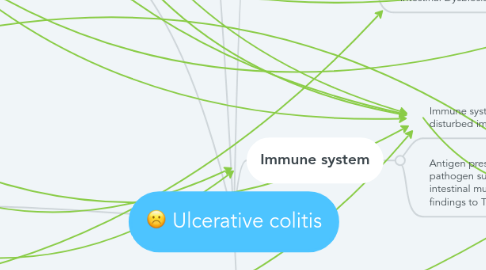
1. Nervous system
1.1. Insomnia
1.1.1. Wakes feeling unrefreshed and irritable
1.2. Fatigue
1.3. Depression
1.3.1. Prescribed antidepressant medication "effexor"
1.3.1.1. Side effect: LOA
1.3.1.2. Side effect: trouble sleeping
1.3.1.3. Effexor has GIT side effects including diarrhoea, possibly bloody stools, this could occur due to hypersensitivity to the drug in the intestines. The drug could be contributing to dysbiosis in the gut
1.4. Extreme stres and emotional disturbances causes alterations in signalling mechanisms and pathways
1.4.1. Since seretonin (5-HT) is critical to regulation of GI motility, alterations in 5-HT biosynthesis, content, release, or reuptake may contribute to disordered GI function
2. Lifestyle factors
2.1. Psychological Stress due to husband cheating and seperation
2.1.1. Stressful events cause hypothalamus to release corticotrophin-releasing hormone which stimulates anterior pituitary to release adrenocorticotrophic hormone (ACTH).
3. Diet
3.1. Dietary choices based on convienience
3.1.1. Refined carbohydrates 4/1 which contain gluten and yeast
3.1.2. Consumes dairy everyday 4/1 which can trigger sensitivities in gut
3.1.3. Minimal fruit 3/7
3.1.4. Minimal vege 2-3/1
3.1.5. Lots of poultry 10/7
3.2. Often skipping meals due to decreased appetite
3.2.1. Potential dietary deficiencies (unkown)
3.3. 3-4 glass of wine per day
3.3.1. Alcohol can trigger UC due to alcohol's pro-oxidant effects and its deleterious effects on gut barrier function.
3.3.2. 3-4 glass of wine per night raises blood cortisol levels and contribute to stress
3.3.3. Daily conumption of alcohol depletes immune system
3.4. 3 coffes per day
3.4.1. High caffeine intake cause secretion of cortisol into blood stream increasing psychological stress and impairs ability to sleep
3.5. Dehydrated
3.6. Diet coke consumption - Artificial sweeteners such as
3.6.1. Artificial sweeteners such as Suclarose, saccarin and Aspartame have been proved to have adverse affects on the immune system
3.6.2. Suclarose, saccarin and Aspartame exhibit side effects that miminc IBD including bloating, severe cramps, diarrhea and even bloody stools.
4. GIT system
4.1. Increased intestinal permeability 'leaky gut' enable toxins to pass into bloodstream more easily, activating the immune system to attack
4.1.1. Inflammation of colon as T cells attempt to attack pathogens but attack own intestinal mucosa cells
4.1.1.1. Mucosal destruction causes erosions that develop into ulcerations which seep pus and can bleed. Blood and mucous found in stools.
4.1.1.1.1. Blood loss, and pain contribute to fatigue
4.1.1.2. Frequent Loose stools (3-4 per day) results due to loss of the destruction of absorptive mucosal surface and rapid colonic transit time.
4.2. Intestinal Dysbiosis
4.2.1. Disrupted gut homeostasis enables proliferation of bacteria in porous intestinal mucosa further exacerbating intestinal permeability
4.2.2. Bloating
5. Immune system
5.1. Immune system under stress contributes to disturbed immune function
5.2. Antigen presenting cells encounter a pathogen such as bacteria in intestinal mucosa, then present findings to T cells
5.2.1. Autoimmune response: Immune system reacts to self antigens to the extent that autoantibodies and T cells damage the bodies own tissues as they attempt to kill pathogen
6. Endocrine system
6.1. ACTH acts on the adrenal medulla to secrete glucocorticoids into bloodstream in response to signals from nervous system
6.1.1. Excess cortisol contributes to sleep troubles
6.1.2. Short term release of cortisol causes depleted immune function
6.1.3. Long term intense secretion of cortisol can cause adrenal fatigue where blood cortisol drops too low, this can lead to increased inflammation
